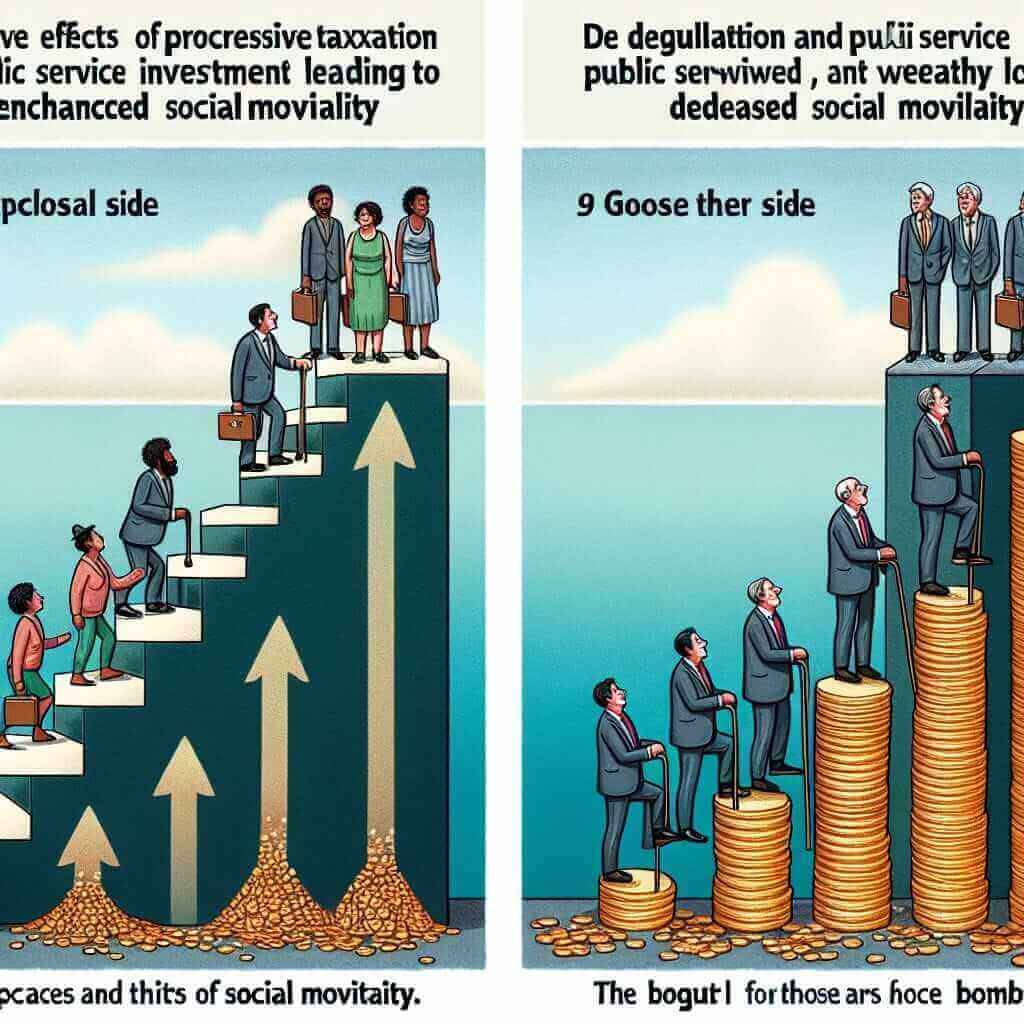In recent years, the interrelation between economic policies and social mobility has sparked various debates among economists, policymakers, and the general public. This topic often appears in IELTS Writing Task 2, requiring candidates to discuss the extent to which economic policies influence social mobility. Let’s look at one to three possible topics related to this keyword:
Sample Topics
- “Some people believe that economic policies significantly impact social mobility. To what extent do you agree or disagree?”
- “Economic policies are often blamed for widening the gap between the rich and the poor, affecting social mobility. Discuss both views and give your opinion.”
- “How do different economic policies influence social mobility, and what can be done to improve it?”
Chosen Topic
Let’s choose the first topic to create a comprehensive model essay:
“Some people believe that economic policies significantly impact social mobility. To what extent do you agree or disagree?”
Analyzing the Topic
The topic demands an evaluation of the extent to which economic policies influence social mobility. We need to express an opinion by discussing various aspects of economic policies and their direct or indirect influences on social mobility.
Sample Essay
Economic policies have long been a significant factor in shaping a country’s economic landscape. While some argue that these policies profoundly impact social mobility, others believe their effect is negligible or marginal. This essay will discuss both perspectives and clarify the extent of economic policies’ influence on upward and downward mobility within a society.
Firstly, it is undeniable that economic policies play a crucial role in either facilitating or hindering social mobility. For instance, progressive tax policies aimed at redistributing wealth can provide lower-income families with better access to resources such as quality education and healthcare. By lessening the financial burden on disadvantaged groups, these policies can open up opportunities for social progression that were otherwise unattainable. Furthermore, minimum wage regulations ensure that even the lowest-paid workers receive a livable income, reducing income inequality and stimulating upward social mobility.
Additionally, government spending and investment in public services, such as education and infrastructure, also directly impact social mobility. Well-funded public schools can offer quality education to all, regardless of socio-economic background, leveling the playing field and allowing individuals to move up the social ladder based on merit rather than birthright. Similarly, accessible and efficient public transportation systems enable individuals from low-income backgrounds to access job opportunities that might otherwise be beyond their reach, contributing positively to social mobility.

However, it is essential to recognize that not all economic policies promote social mobility. Some policies, such as deregulation and tax cuts for the wealthy, often result in increased economic disparity. For example, reduced corporate tax rates might lead to higher profits for businesses, but these benefits seldom trickle down to lower-income employees. Instead, the wealth gap widens, and social mobility is hindered as the rich get richer while the poor struggle to make ends meet.
In conclusion, economic policies have a significant impact on social mobility, though the extent of this impact varies based on the nature of the policies implemented. Policies aimed at wealth redistribution and public service enhancement can greatly enhance social mobility, while those that favor deregulation and tax reductions for the affluent may impede it. Therefore, it is crucial for policymakers to consider the broader societal implications when drafting economic policies to ensure that they promote equality and provide opportunities for all.
(374 words)
Important Notes When Writing the Essay
Vocabulary and Phrases
- Progressive tax policies: Measures aimed at taxing individuals based on their ability to pay, where higher incomes are taxed at higher rates.
- Redistribute wealth: The reallocation of resources across a population to reduce disparities.
- Upward/downward social mobility: The ability or inability for individuals to move higher or lower in social status and economic position.
- Minimum wage regulations: Laws that set the lowest hourly rate that workers can legally be paid.
- Income inequality: The uneven distribution of income within a population.
- Deregulation: Removing or reducing state regulations, typically in the economic sphere.
- Public spending: Government expenditure on public services and goods.
Grammar Focus
- Complex Sentences: Using subordinate clauses to add depth to sentences (e.g., “While some argue that these policies profoundly impact social mobility, others believe their effect is negligible or marginal.”).
- Passive Voice: Employed to emphasize the action rather than the subject (e.g., “resources such as quality education and healthcare can be provided”).
- Conditional Sentences: Indicating possible outcomes (e.g., “If policymakers consider the broader societal implications…”).
Difficult Vocabulary
- Facilitate (verb) /fəˈsɪlɪteɪt/: Make an action or process easier.
- Deregulation (noun) /ˌdiːrɛɡjʊˈleɪʃən/: The removal of regulations or restrictions.
- Disparity (noun) /dɪˈspærɪti/: A great difference.
- Merit (noun) /ˈmɛrɪt/: The quality of being particularly good or worthy.
- Socio-economic (adjective) /ˌsəʊsɪəʊˌɛkəˈnɒmɪk/: Relating to or concerned with interaction of social and economic factors.
- Accessible (adjective) /əkˈsɛsɪb(ə)l/: Easily reached or entered.
- Implications (noun) /ˌɪmplɪˈkeɪʃ(ə)nz/: The conclusion that can be drawn from something although it is not explicitly stated.
Conclusion
In summary, understanding the nuanced impact of economic policies on social mobility is critical for effective essay writing in the IELTS exam. Candidates should focus on presenting balanced arguments, using advanced vocabulary, and structuring their essays coherently. Other potential essays related to this topic might include:
- “To what extent can government intervention reduce income inequality?”
- “Discuss the role of education policies in promoting social mobility.”
- “Evaluate the impact of globalization on social mobility within developing countries.”